It’s not hard to get started as a travel blogger. Register a new domain, install a theme, customize its design a bit, and your blog is ready to go live. What’s harder is to approach the moment when you can monetize your wanderlust. If your readers are old friends and a few friends of friends, you won’t earn for a living that way. Blogging is a profitable investment only when there’s a big audience.
So, how can your blog go beyond a tight circle of your friends? First of all, it’s about the content you publish and the way you optimize it. In this guide, you’ll learn how to pick keywords that have good traffic potential to help you write killer blog posts that get traffic.
1. Focus on problem-oriented keywords.
Let’s say you’ve joined a few affiliate programs, made compilations of their products, and are looking forward to sales. Not so fast. You may be surprised, but readers don’t give a damn about the commissions you’re trying to earn. The only thing they care about is how to avoid problems on trips and make them more enjoyable. Regular folks can afford vacations only once a year, so nothing should spoil this wonderful time.
The bottom line is to write blog posts around keywords related to travelers’ problems and needs. How-to is an effective keyword pattern in such a case:
- how to hide cash while traveling;
- how to keep medicine cold while traveling;
- how to eat healthy while traveling.
Being an active traveler, you must have learned a lot of lessons on your trips. But some people may face challenges you’ve never thought of. To get into the mind of your target audience, start hanging out on travel forums, social communities, and Quora. You’ll come up with a lot of keyword ideas for your travel blog.
You may notice people ask the same question on multiple forums. It’s a direct signal that there’s been no clear solution yet. Don’t miss your chance to be the first who writes a detailed blog post on that issue.
Google can also guide you on travelers’ common queries. It has two handy features to give you keyword hints – Autocomplete in the search bar and Related Searches under organic results.
Autocomplete will show you different ways to complete a travel query while you’re typing it.

Related Searches will unveil even more variations of the query you typed into the search bar.
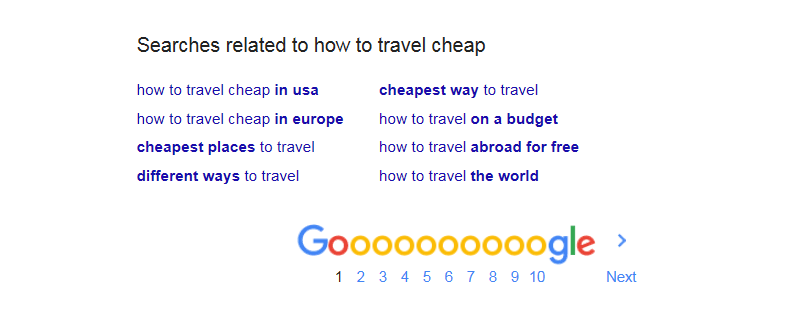
Besides browsing elsewhere, you can extract keywords directly from your affiliate products. Just think of what purposes they serve. Here are some examples:
- door guard alarm – how to make your hotel stay safe;
- wash bag – how to do laundry while traveling;
- mini steam iron – how to keep your clothes wrinkle-free on trips.
2. Be specific with travel product keywords.
Some travelers type in product names when performing a search. They already know what items can improve their travel experience and look for the best of them. Besides the how-to keyword pattern, you can optimize blog posts for your affiliate product names.
The key here is to be specific in wording. The competition for broad terms is too tough to withstand, especially if you are just starting out. Let’s say you want to create a compilation of the best travel bags. The keyword “travel bag” is too broad to use as is. There are many ways to make it more specific. For example, you can mention the bag type, design, purpose, and many other criteria shown below:
- bag type: anti-theft crossbody travel bag, best rolling duffel bag for travel, padded stroller travel bag;
- features: travel bag with a laptop compartment, travel tote bag with pockets, travel bag with a water bottle holder;
- purpose: travel bag for a passport and money, travel bag for a car seat and stroller;
- size & weight: small camera bag for travel, large travel bag with wheels, lightweight travel duffel bag;
- material: faux leather travel bag, nylon travel bag with a zipper;
- sex: women’s travel toiletry bag, men’s leather duffel travel bag;
- travel type: overnight bag for business travel, carry-on bag for international travel.
Note that you can combine different criteria in a single keyword for greater specificity.
In SEO, specific phrases are known as long-tail keywords. Compared to broad terms, they get fewer searches per month (around 30-80), but can bring much more page visits than that.
When travelers search for the same info, they often use different queries. With the rollout of RankBrain, Google doesn’t care about minor differences in wording. First and foremost, the engine analyzes the intent behind each query and returns results based on it. That way, a blog post optimized for a single long-tail keyword can rank for hundreds of similar queries.
Let’s find out what Google’s ranking algorithm neglects today.
Word Form
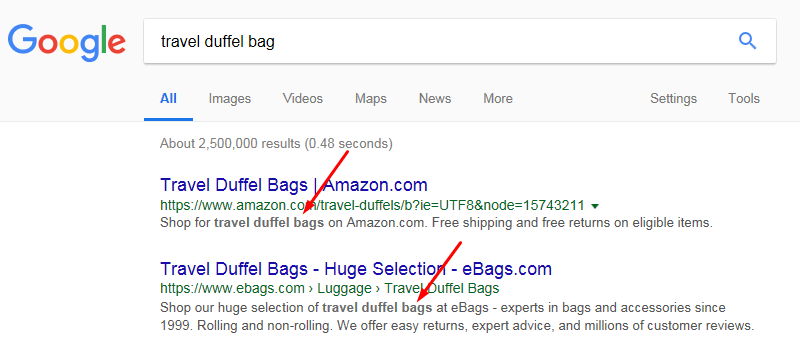
Gone are the days when Google interpreted queries letter for letter. Today, if you type in the query “travel duffel bag” in the singular, the engine will return results optimized for its plural form.
Query Structure
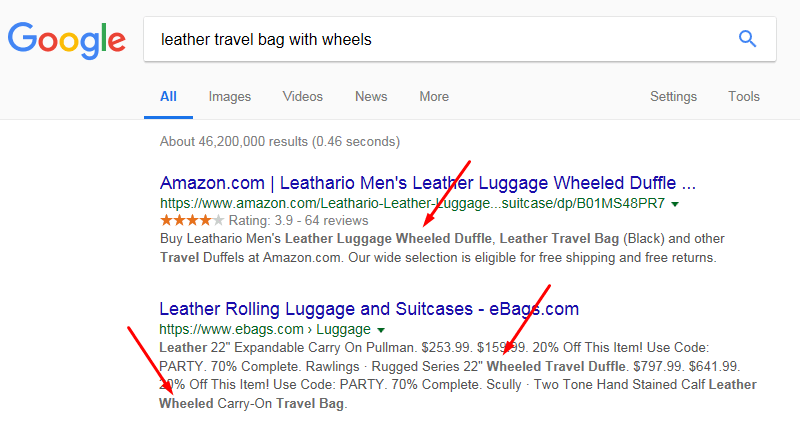
Let’s type in the query “leather travel bag with wheels.” In organic results, the prepositional phrase “with wheels” is replaced with a participle “wheeled.” It means Google ignores such minor things as prepositions, conjunctions, word order, and even the part of speech.
Synonyms
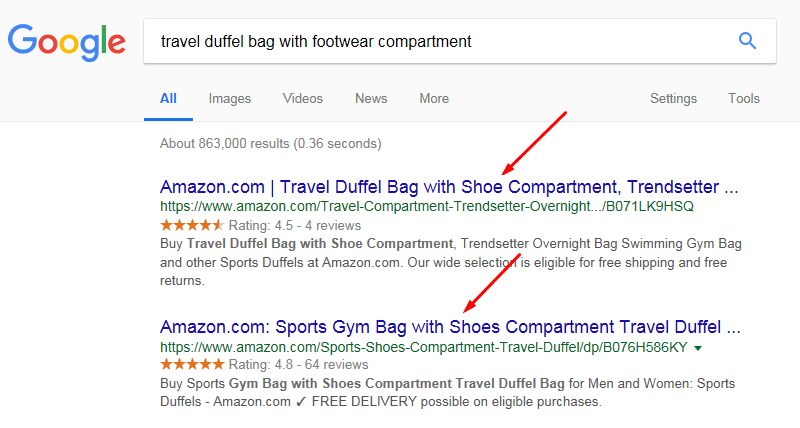
Besides minor grammatical stuff, Google is smart enough to understand synonyms. For the query “footwear compartment,” the engine ranks pages optimized for “shoe compartment.”
3. Try broad travel terms that are easy to rank for.
There is also some low-hanging fruit among broad terms. To detect easy-to-rank keywords in the travel industry, you’ll need to take note of the following metrics.
Difficulty
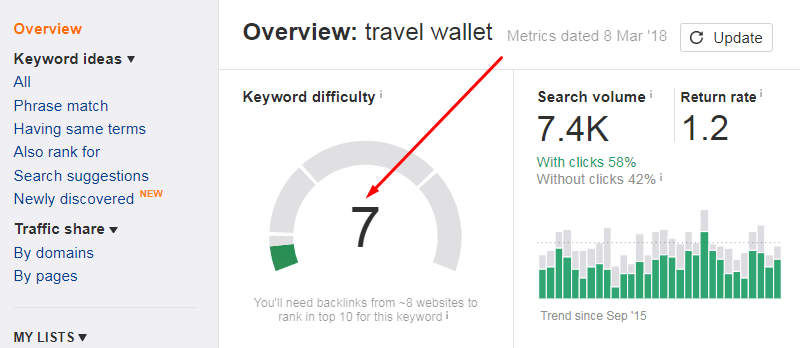
First of all, you must learn how difficult it is to get to the top with a broad keyword. For example, “travel wallet” has a ranking difficulty of 7 and search volume of 7.4K. With such a low difficulty score and so many monthly searches, it’s definitely worth a try.
Clickability
If a keyword gets thousands of searches, it doesn’t mean all of them become page visits in the end. In some cases, Google gives clear answers at the very top of SERP. It’s quite convenient for users but steals traffic from bloggers.
For example, the query “Eiffel Tower height” gets 5.1K searches per month, but 82% of them never turn into clicks.
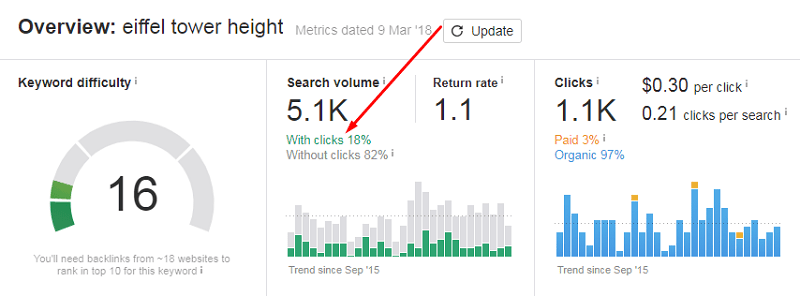
Google reveals the height of the tower above organic results. That way, users don’t need to scroll down and visit any of the top 10 pages.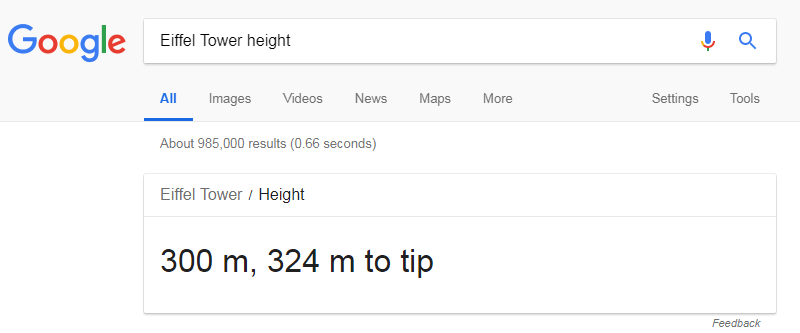
Before writing a post around a promising keyword, check out how SERP looks for it. If there’s an instant answer, most likely your efforts won’t pay off. Instead, opt for keywords with a higher click-through rate.
Seasonality
Some topics spark travelers’ interest only in high season. The rest of the time, they get minimum searches and, therefore, drive almost no traffic. Go to Google Trends to check how long a particular keyword is in demand during a year.
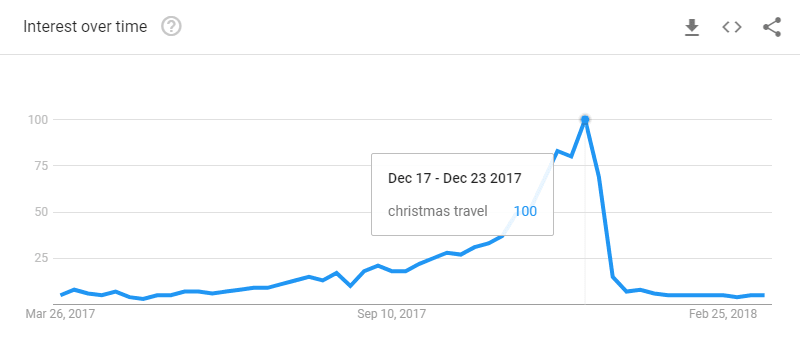
Here’s a striking example of seasonal keywords. The interest for “Christmas travel” starts growing in September and reaches its high a few days before Christmas. Then, it drops and stays low for the rest of the year.
4. Borrow keywords from top travel blogs.
Your competitors already know all the juicy keywords in the travel industry. You can easily discover them too using SERP checkers, even if you have no time for in-depth research. These tools show how much traffic top pages get for a specific query and what keywords bring that amount of traffic.
Choose terms with a low ranking difficulty and optimize your blog posts for them. It will let you drive some of the top bloggers’ traffic to your posts.
5. Use unique travel keywords that competitors overlook.
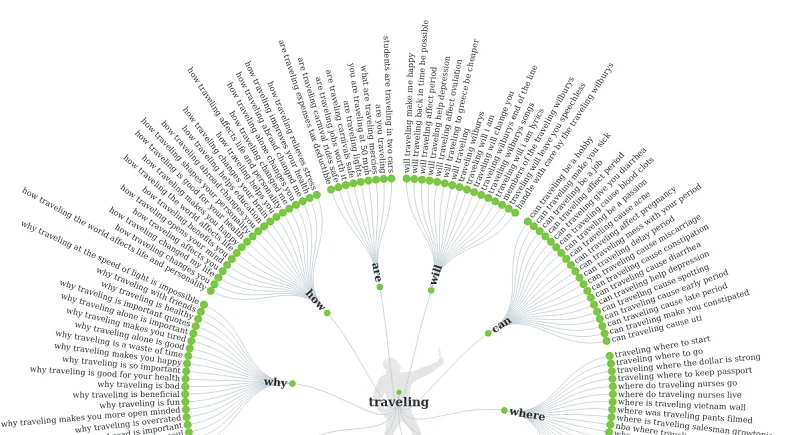
To make a name for yourself, you can’t just imitate other travel bloggers. Taking their keyword ideas can do the thing for a start. But once your blog gets some traffic, you should think over unique topics. That’s what Answer the Public can help you with. This free tool can generate nearly 900 suggestions for one keyword “traveling.” For convenience, they are divided into five groups:
- 165 questions;
- 140 prepositional phrases;
- 83 comparisons;
- 488 alphabeticals;
- 20 related keywords.
Once you click on any keyword of your interest, it will bring you to its results page in Google. You’ll see what’s already been written on that topic to understand whether you can come up with something unique.
Wrap-up
Your travel blog can become a financially rewarding occupation if you optimize it the right way. Of course, monetization doesn’t happen overnight. You can start out while working for the big boss. But once your income is enough for a living, you can quit your 9-5 job and travel the world, gaining priceless experience and sharing it with others in your posts. Do you already run a travel blog? Feel free to share what keyword strategies worked for you!
About the Author
Nick Campbell is a content creator and marketer at Ahrefs with passion for technology, SEO, and copywriting. Work up every idea from chaos to clarity is his motto.
He is an expert travel advisor and enthusiast. He has traveled extensively in the USA, Central America, South America, and Europe. He has visited every Sandals Resort and is one of a select few Diamond Elite members of the Sandals Chairman’s Royal Club.
Dan graduated from Johnson & Wales University with an associate degree in Culinary Arts. Later he graduated from the University of Utah with a bachelor’s degree in International Studies with a focus on people and culture.

